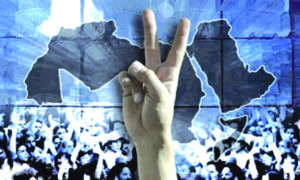September 12-14

The inflation in the number of pretenders to “supreme leadership” in the name of Islam has led to a drastic devaluation of each individual claim. Mullah Mohammed Omar in Afghanistan, Ali Khamenei in Iran, Abubakar Shekau in Nigeria, Ayman Al-Zawahiri (possibly somewhere in the Pakistani badlands), and, last and least, Abu Bakr Al-Baghdadi, all pretend to be leader of the Ummah (Islamic community) simply because they have some guns and money at their disposal, albeit some more than others. However, today, each pretender appears less credible than before the Islamic State of Iraq and Syria (ISIS), or “Da’esh” in Arabic, started its killing spree in Mosul.
Long-time campaigners for the revival of the caliphate, notably Hizb Ut-Tahrir, have refrained from endorsing any of the rival pretenders, while the talk in Afghanistan’s radical Islamist circles is about elbowing Mullah Omar aside to allow genuine peace talks to start with the future government in Kabul. In Nigeria, Shekau’s proclamation of a “caliphate” has not secured unanimous support among rival bands peddling militant Islam. Even in Iran, the possibility that the “Supreme Guide” may not really be that supreme is now evoked in public by some of Khamenei’s former close associates.
On the political front, the Iraq crisis has shown that building a new system is not as easy as many had thought. Iraq has gone through all the steps needed to build a consensual political system. That, however, has not put an end to despotic tendencies that seem to have lodged themselves in the nation’s political genes. It is clear that without some level of popular support, ISIS would not have been able to install itself with such relative ease.
From a moral standpoint, the ISIS experience has exploded another myth, according to which recourse to extreme violence is a result of poverty and hunger. The ISIS crowds don’t seem to be short of money and certainly don’t look as if they have missed a meal. As already noted, the group’s leaders also seem to have a taste for luxuries, including Swiss watches.
On a broader cultural front, the Iraqi crisis has punctured the myth that Muslim communities in Western democracies would, by some unspecified means and at some unspecified time, act as vehicles for exporting enlightenment to the Muslim world, which is supposed to be flailing blindly in the dark.
The experience of ISIS and kindred groups shows the opposite. Far from exporting “enlighteners” to the Middle East, Muslim communities in Western democracies are sending experts in cutting the throats of unarmed captives. According to Western intelligence estimates, ISIS now has a total force of around 17,000 men of which fewer than 5,000 are believed to be Iraqis, mostly leftovers from Saddam Hussein’s Presidential Guard. The rest are self-styled “ghazis” from more than 30 countries across the globe, including over 3,000 from the European Union and North America. One could observe a similar pattern with the Taliban in Afghanistan, Boko Haram in Nigeria, and Yemen’s Al-Qaeda in the Arabian Peninsula.
Some of the “Western” Muslims who travel to Islamic countries to do a bit of “ghazva” have gained military experience by serving in European and/or North American armies. They have a high profile in managing the propaganda machines of self-styled jihadist gangs.
Interestingly, much of the propaganda material, including pamphlets and video footage, used by these enemies of humanity is produced in the West, especially in Geneva, Brussels and, of course, London and Birmingham. Obsessed with multiculturalism, Western Europe has become a breeding ground for evil groups that threaten peace and stability in several Muslim countries.
On the geopolitical front, some of the local bad guys, including the Assad gang in Syria, the hardline sections of the Kurdistan Workers’ Party in Turkey, and the Tehran mullahs are trying to improve their image by offering to help the West fight “terrorism” in the Middle East. Tehran is even offering to send its Lebanese Hezbollah units to help the Iraqi Kurds fight the forces of “Caliph” Abu Bakr (aka Ibrahim).
Assad’s volunteering to fight the so-called “jihadists” is especially interesting because it was his regime that offered them safe haven and secure passage into Iraq between 2003 and 2010. Even now, many Iraqi bad guys, including Saddam’s number-two Izzat Al-Douri, are believed to be operating from areas that Assad still controls in Syria.
Making alliances with some bad guys to fight even worse characters is nothing new in history. However, the consequences of such alliances are always hard to gauge. In the case of Assad’s application for a job fighting “terrorists,” we must bear in mind an important point, elaborated by Aristotle in his Ethics: by siding with one evil against another evil, one risks becoming partly evil oneself.
The Middle East is confronting a wide range of evil forces of which ISIS is the latest, and in my opinion, the most vicious to date. Any alliance with other evil forces to fight ISIS would amount to an implicit admission that the Middle East is doomed to live with one form of barbarity or another.
However, a coalition of vital forces in the region, including traditionalists and aspiring democrats, would enjoy a more solid popular base and would thus have a better chance of defeating those who wish to return the region to the dark ages. Our choice is not limited to different shades of evil.
Amir Taheri has worked at or written for innumerable publications, published eleven books, and has been a columnist for Asharq Al-Awsat since 1987.